Abstract: In the context of global ecological degradation, scholars and practitioners have increasingly emphasized the interconnectedness of education and ecology, with particular attention given to the concept of ecological literacy. Over the past decades, numerous definitions, approaches, and conceptual frameworks have emerged for ecological literacy, each associating it with various meanings and methods. This broad scope is a significant characteristic of ecological literacy as it underscores its interdisciplinary nature. However, for stakeholders in the field of ecological literacy as well as related domains such as environmental education and sustainability education, this plurality of meanings has become problematic because it creates confusion and makes the concept difficult to work with. This article assesses the concept of ecological literacy to enhance the general understanding among researchers and practitioners. It is structured into four main sections: definition of the concept, early articulations, frameworks, and empirical research. Finally, the article concludes with a discussion on the implications of these findings for environmental educators.
Continue Reading
Abstract: This article traces the evolution of MoonPads, a social benefit company founded by the author, weaving a narrative that spans personal experiences, academic pursuits, and a commitment to sustainability, social equity, and menstrual justice. The article explores the interconnected journey from childhood influences, through academic endeavors in sustainability education, to the entrepreneurial realm, shedding light on the intersection of gender equity and environmental sustainability. MoonPads emerged as a response to period poverty, seeking to provide accessible and eco-friendly menstrual products while challenging societal stigmas surrounding menstruation.
Continue Reading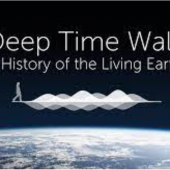
Abstract: At Schumacher College, Dartington, UK in 2008 we introduced the Deep Time Walk – a transformative learning experience in which college participants walk 4.6km in the countryside of the Dartington Estate representing the entire 4,600 million years of our planet’s history. The aim of the walk is to increase the ecological awareness of participants by giving them an embodied experience of the immense age of our Earth. At certain points during the walk a facilitator explains key events in earth history, such as the formation of the planet and the first appearance of living cells. Here we assess the effectiveness of the Deep Time Walk offered to eleven distinct groups of walkers during 2022 -2023. Participants on each of the eleven Deep Time Walks were asked to respond to a simple questionnaire asking them to quantify how much of seven qualities they felt immediately before and immediately after their walk (these were: Awe and Wonder, Sense of Earth’s Ancientness, Connection to Nature, Consequences of the Crisis, Hope, Commitment to Personal Change and Commitment to Political Change) . In total, 153 participants took part in the eleven walks and responded to the questionnaire. Analysis of the data showed a highly statistically significant increase across all seven qualities (p<0.00001 for each quality), suggesting that the Deep Time Walk is an effective means for developing and enhancing ecological awareness and commitment to action in these times of severe global crisis. Qualitative data were not collected during this phase of the study due to time limitations during walks. We recognise the importance of this kind of data and are devising ways of gathering it for both past and future walks.
Continue Reading
Abstract: One way to disrupt traditional Eurocentric teaching practices is through modifying curriculum in classes. Particularly, in an English Composition 101 course, an ongoing assignment called the Poetry Journal may assist students in thinking critically and reflexively. The concept was inspired by a high school English teacher, Brett Vogelsinger (2016), called “4 Reasons to Start Class with a Poem Each Day.” His four reasons: 1. Poems are short; 2. Poems are intense; 3. Poems connect (to other readings); 4. Poems inspire (writing). When building the assignment for a community college class, an instructor may make intentional (disruptive) choices for the poems. This article explores the project, which is grounded in culturally sustaining (Paris, 2021) and disruptive pedagogies (San Pedro, 2018)—both of which encourage the rethinking and dismantling of traditional Eurocentric-based instruction—and how the author (full-time faculty at a community college) applied said pedagogies to a specific in-class student activity to engage students in critical and reflexive thinking.
Continue Reading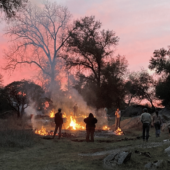
Abstract: The Keepers of the Flame Initiative, now in its fifth year, is a dynamic partnership between cultural fire practitioners, UC Davis faculty, and a diverse study body. This experiential learning initiative at the University of California, Davis centers Indigenous Fire Workshops, focusing on cultural fire. By centering Indigenous science and teaching approaches, this initiative inherently becomes high impact. High Impact Practices (HIPs) are pivotal educational interventions that promote holistic student development and experiential learning. These practices encompass features such as setting appropriately high expectations, experiences with diverse people and circumstances, sustained student engagement over an extended period, meaningful interaction with faculty and peers, public demonstration of learning, real-world relevance of classroom learning, and structured opportunities for reflection. The Keepers of the Flame Initiative incorporates two types of powerful high impact practices: collaborative group projects and community-based learning. These educational practices significantly enrich student learning and particularly benefit historically underserved students as well as broader student populations. I analyze HIP features within the Keepers of the Flame Initiative using survey data gathered in winter 2023, while also delving into the importance of Indigenous-led educational approaches. Indigenous perspectives and educators are crucial in broadening educational approaches, providing a pathway to uphold sovereignty of diverse knowledge systems, and nurturing a sense of responsibility towards land stewardship and environmental justice.
Continue Reading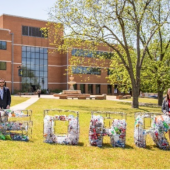
Abstract: Southern Arkansas University has developed the SOAR Sustainability Conference to spotlight current sustainability-related efforts. SOAR, representing the southern Arkansas region, was added to the conference name to signify the area of emphasis for the event. This spring conference event has been held in April of 2022 and 2023. The 2023 conference included over 50 presenters from academia, private businesses, government agencies, and volunteer organizations. Session topics were aligned with the critical components of sustainability education including anticipatory thinking, empathy, change of perspective, justice, responsibility, and ethics. Surveys were distributed to SOAR conference attendees to gauge their level of attitudes, knowledge, and behavior regarding sustainability issues. Responses were very positive overall, showing gains in attendees’ attitudes, knowledge, and behavior between 2022 and 2023. The behavior category showed the largest annual increase while knowledge gains over the same period were lower. Overall, the SOAR Sustainability Conference has shown success in engaging students and community stakeholders to take part in this effort to address sustainability-related challenges in the area.
Continue Reading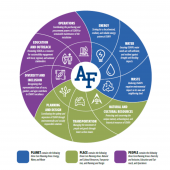
ABSTRACT: In this paper we offer an approach to sustainability-related education that can help students integrate the lessons they are learning in the classrooms to the type of real-world applications they will encounter in the workplace. We believe that by using our campus as a living-learning laboratory and engaging students in hands-on projects within a campus lab that directly contribute to one of their institution’s leading sustainability initiatives, we can unlock the highest levels of educational achievement and student satisfaction. We describe our course as intentionally designed because we have developed it with a specific purpose that goes beyond the stated learning objectives. Our course not only addresses recognized institutional and course-level educational outcomes, but also uses a community engagement approach that also directly supports important aspects of an enterprise-wide Sustainability Strategic Plan. We present relevant literature, highlight the significance of our approach to sustainability education, and describe its impact at our institution and in the community. We then offer detailed descriptions of our course’s activities, discuss lessons-learned and suggest future potential avenues of research and application. We hope this case study may prove to be an exemplar or a catalyst for other institutions of higher education as well as inspire further research aimed at improving sustainability education.
Continue Reading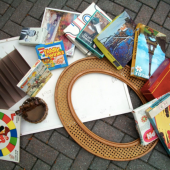
Abstract: This photo essay illustrates my journey of decluttering my childhood home. I have spent eight-months decluttering so far. Interestingly, I initially planned to declutter quietly and not document my experience. But the more I decluttered, the more I felt there was a story to tell, a cautionary tale of sorts. In this essay, I document my reflections on decluttering and raise questions about Western consumer culture. Logos and brand names have intentionally been edited/removed from photos.
Continue Reading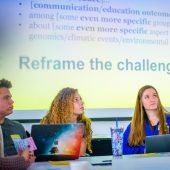
Abstract: While the majority of today’s youth accept climate change as a factual phenomenon, many educators and their curricula lag behind with a continued emphasis on confronting climate skepticism and denial. This article highlights our experience teaching a course, Climate Change and Sustainability, in which we encountered disruptive objections to our lessons from students who believe climate change is happening and desperately want action. However, the all-or-nothing stance of these students stifled conversation, and their lack of engagement with various topics kept them uninformed. To address these issues, we recommend structuring classroom debate around consensus-building activities to practice solution-oriented communication.
Continue Reading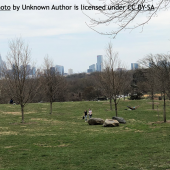
Abstract: This case study discusses the implementation of a park audit project with undergraduate college students in teacher education and public health programs. With a focus on drawing attention to the importance of urban green spaces in these two professional fields, the design of this project extended course activities into local parks. Students prepared to conduct park audits by engaging with course material focused on the importance of urban green spaces for individual health and children’s development, as well as inequities in access to high quality parks. The capstone of the course project was the audit of parks using the Community Parks Audit Tool (CPAT) in which each student assessed several parks in their local communities and documented their findings. This article discusses the contextual relevance of this project, its value in increasing attention to environmental considerations in the education and public health fields, as well as student responses to the implementation of the project in these specific classes.
Continue Reading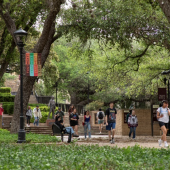
Abstract: The concept of sustainability has been gaining increasing attention worldwide, especially over the last 30 years. To foster sustainable development, education plays a crucial role. Higher education institutions have assumed the leading role in sustainability education and advocating sustainability. However, the literature that evaluates sustainability initiatives at higher education institutions is still fragmented and sparse, with existing studies often focusing on certain aspects of the sustainability initiatives. We designed a questionnaire that covers a broad spectrum of sustainability measures in the operation, curriculum, research, and outreach, which allowed us to investigate the perceived importance of those sustainability initiatives from the perspective of university community members including undergraduate students, graduate students, faculty, and staff at Texas State University in San Marcos. Our results indicated that the Texas State University campus community believes that the themes of Waste Management, Buildings & Infrastructure, and Water Use & Management were the most important themes. The campus community believed that Transportation and Academics are the least important themes. We also identified a set of action items under each theme the most and least important.
Continue Reading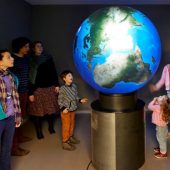
Abstract: This paper reports part of a larger study on the development of systems thinking skills in German 7th grade comprehensive school students regarding the climate. Research has shown a fragmented understanding of climate change among students that hardly accounts for the dynamic interrelations in the climate system and may pose a barrier in understanding adaptation and mitigation strategies (Shepardson et al., 2017, 2011, Calmbach 2016). While much is known the impact of short-term interventions on the general system understanding of students, what is lacking to date is 1) a specific intervention on climate system understanding and 2) insights into the process of developing system understanding in students. Helpful insights in this context come from Conceptual Development theories for they allow the development of systemic thinking to be viewed in terms of conceptual expansion or conceptual change. Starting from these desiderates, a teaching-learning sequence was developed based on the SYSDENE model of system competence (Frischknecht et al. 2008). In the sequence young learners systematically link experiences from formal science education with the experiences at three non-formal learning environments. A mixed-methods approach was used to explore the impact of this 3-month sequence on 19 7th grade students. A written pre-/post-test suggested a significant improvement in Climate System Reconstruction for the group (pre-test Median = 6.75 vs. post-test Median = 12.5, Wilcoxon Test: p = .003, r = .82). However, a qualitative analysis of classroom conversations, interviews and concept maps indicated that cognitive development toward a higher level of system thinking was neither continuous nor did every student reach it. Moreover, the SYSDENE model’s Competence Area “Describe System Model” proves critical. Being able to describe the main climate system factors is not sufficient, one also needs to be able to distinct weather from climate and grasp several scientific concepts related to the climate (e.g. greenhouse effect, water cycle, evaporation, reflection) in order to understand climate as a system.
Continue ReadingLink to the JSE Winter 2023 General Issue Table of Contents Editor’s Note: This contributed poem connects with the Councils of All Beings article by Karen Hindhede in this issue. In this circle wide in species and sparkling imaginings In this circle of story-sharing about sharing stories The call goes out rippling through Creatures, Places, […]
Continue ReadingAbstract: Actualization of the 17 sustainable development goals (SDGs) conceived by the United Nations in 2015 is a global challenge that may not be feasible in sub-Saharan Africa by the year 2030, except higher education play a committed role. There is need for higher education to embrace partnership and train people on the concepts of sustainability and sustainable development in the region. This paper presents a model center with curricular framework and partnership structure for the training. The Model Center for Sustainability Studies (MCSS) will enable partnerships with institutions in Africa and in advanced nations, thereby creating a global network for sustainability studies not found in sub-Saharan Africa. MCSS will train and certify public servants, government agencies, policymakers, entrepreneurs and personnel from organizations and students on aspects of the SDGs and sustainability science. It is important to add sustainability into environmental education and make environmental education a compulsory course in higher institutions and a secondary school certificate exam subject in sub-Saharan Africa. MCSS has 11 training modules that can be replicated anywhere in the world. Higher institutions in sub-Saharan Africa should follow this training perspective, to achieved SDGs, predicted 2040 against 2030.
Continue Reading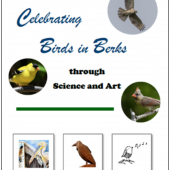
Abstract: Sustainability depends on biological diversity and the investment of individuals and communities in maintaining ecosystems. To engage the public in local biodiversity—specifically birds—we developed a program combining science and the arts. The science involved a group field experience, led by area birders guiding observations and providing information on the birds; the arts produced written reflections and visual representations of the birds and birdwatching. The integration of experiences, as manifested in field notes, artwork, and writing, reinforced understanding of, as well as interest in, birds and their natural habitats. In short, the data confirmed that participants gained a deeper appreciation for the natural world when seeing it in the contexts of both science and creative expression.
Continue Reading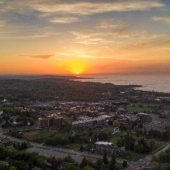
Abstract: Sustainability is a core value of Gen Z and is increasingly a focus of campus strategic plans. Undergraduate survey data can inform campus programming by increasing our understanding of student sustainability behaviors, knowledge, attitudes, and how these relate to student participation in curricular and cocurricular activities. Repeated surveys can track change over time in general and among underserved demographic segments of the student population. Here we evaluate the first in a series of biennial sustainability surveys that will guide planning at a mid-sized midwestern university in the USA. Our survey, modeled after existing surveys, was distributed to undergraduate students at the University of Minnesota Duluth (348 respondents) and collected demographic information including: college affiliation, year in school, gender, race/ethnicity, and campus residence. Our study showed that student knowledge scores were comparable to similar surveys at other institutions (66%) and the average attitude score was very high (88%). However, scores related to sustainability action were strikingly lower, indicating a gap between students’ understanding and acceptance of sustainability concepts and their willingness to engage, which we refer to as value-action gaps. When significant differences were detected between demographic groups, students who self-identified as female were more likely to have a higher sustainability score than students who identified as male and students who lived off campus were more likely to have a higher score than students who lived on campus. Other demographic results were mixed or not significant. We also noted a trend for students to score lower on questions related to business or economic sustainability and, similarly, for business students to score lower on sustainability questions overall than students in other colleges. Based on these baseline results, we provide recommendations to improve sustainability education and address the value-action gaps identified in this survey.
Continue Reading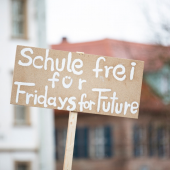
Abstract: The contribution first outlines the state of research on the relatively new Fridays for Future (FFF) movement and categorises first studies particularly from a German perspective, to provide a basis for a further differentiation in this field of research. In this context, fundamental aspects of the movement are presented. The self-concept of the German Fridays for Future movement in terms of a young protest movement with a global orientation is then compared against the educational tasks stipulated in the school legislation of the federal states (Bundesländer) with their societal-educational objectives. The contribution focuses on the question in how far the self-concept of the German branch of the FFF movement as an international protest movement and the activists’ engagement for climate protection and political participation is reflected in the educational objectives stipulated in school legislation. Statements are analysed regarding climate and environmental protection, participation and democracy and transnational references in the school legislation. A link can be found between the self-concept of the Fridays for Future movement and school legislation, but this does not resolve the conflict between the school strikes and compulsory schooling – a conflict that is intended by FFF to highlight the perceived urgency of the cause. Schools, educational administrators and educational policymakers are thereby urged to take a stance.
Continue Reading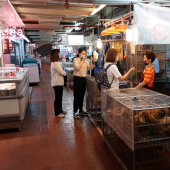
Abstract: This article provides a case study of place-based sustainability education on the use of plastic bags in a wet market in Hong Kong. We organised two field trips and engaged 20 students in conducting both quantitative and qualitative research in the wet market to examine single-use plastic consumption. Our research has found that at least 1 million plastic bag is consumed on a daily basis in all the wet markets in the city of Hong Kong. Qualitatively, we found that some of the vendors may use plastic bags as a sale strategy and to engage with customers in conversations. In contrast to the conventional schooling that promote sustainability or plastic reduction in a very abstract sense, the place-based education we attempted aims to critically rethink the concept and knowledge of sustainability in ways that also empathize with the local tradition, and remain critical of modern corporate branding, and modernization discourse. The paper ends with a discussion on reflecting plastic use in traditional wet markets in contrast with chained supermarket shifting to more plastic pre-packages.
Continue Reading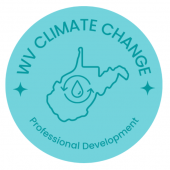
Abstract: The West Virginia Climate Change Professional Development (WVCCPD) Project was developed in 2019 as an effort to engage West Virginia K-12 teachers and informal educators in climate change professional development to encourage learning and action. Started by astronomy educators who are passionate about climate change, the project has been an experiment that has iteratively grown each year. By bringing in social science experts, communication specialists, community activists, master teachers, and learning how to best support teachers and their students through misconceptions and empowering action, we have engaged over 130 W.Va. educators. WVCCPD represents a promising case study for how educators can come together across disciplines and institutions to build an engaging climate change learning community, even in West Virginia, an area that is known for fossil fuel extraction. We hope this paper informs other teacher education practitioners.
Continue Reading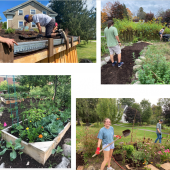
Abstract: This case-study supports the implementation and social investment in university campus community gardens as an interdisciplinary resource for academic research, extra-curricular activities, and community building. Using a permaculture design model, the St. Lawrence University community permaculture garden in Canton, New York State exists to enhance the diverse academic curriculum and varied community engagement opportunities to provide experiential and interdisciplinary learning opportunities for students, faculty, staff, and remaining stakeholders. This case-study will focus on one of St. Lawrence University’s student-led clubs, its operations, history, and challenges (e.g., participant transience). Our findings suggest that campus permaculture gardens require adequate investment, including financial and academic support. The development of a conceptual seasonal and academic community calendar provides a fundamental framework for operations and governance. The sheer number of opportunities and broad capacity of the club and the presence of physical student space brings meaningful accessibility and community engagement. Over time, the club and garden has remained resilient due to a holistic approach which keeps the bigger picture in mind. Each year the club faces a variety of challenges and obstacles, yet such experiences have provided opportunity for adaptation and evolution. Recommendations can be used to support a replicable model for other educational environments and communities in both urban and rural areas, interested in developing a permaculture garden as a resource that improves social cohesion during a time of ecological fatigue, social unrest, the COVID-19 pandemic, and climate change.
Continue Reading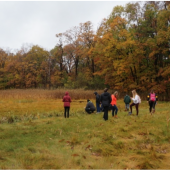
Abstract: I find it concerning, as a former elementary teacher and now a teacher educator, that not much attention is given to the preparation of new teachers on the environmental and social crisis of climate change. I have taught in two teacher preparation programs at public universities in the United States and understand the complexities, barriers, and limitations that these programs must contend with when trying to implement something new into an existing curriculum. In this paper I will describe my first attempt in navigating through the process of trying to include climate change education into a teacher preparation program. The focus of this initial effort was to understand the climate change literacy and self-efficacy towards teaching about climate change of the students in my elementary science teaching methods course.
Continue Reading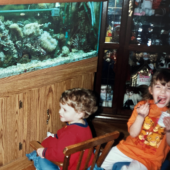
Abstract: Gaining a better understanding of human behavior change is vital to encouraging individuals to adopt an environmentally sustainable lifestyle and to the long-term goal of preserving nature. To explore how life experiences lead to the adoption of environmentally sustainable behaviors, this author turned to autoethnography. Through this reflective method, the author examines their development of environmental identity and their experiences with nature, as they relate to major concepts within the field of conservation psychology, such as ecological literacy, Theory of Planned Behavior, and connection to nature. Leading concepts concerning environmental identity in the conservation psychology literature suggest a very specific pathway for developing environmental identity, and thus pro-environmental behaviors, including experience in nature from a young age, the presence of an environmental mentor, and access to environmental literature. However, the author reveals that there may be other pathways to development of environmental identity, which include virtual environmental mentors (e.g., nature TV show hosts), environmental media (e.g., magazines, documentaries, and internet sources), and other methods of driving emotional connection to nature (e.g., sense of place). Alongside the author, the reader will have the opportunity to consider their environmental experiences and factors influencing their environmental identity, in relation to these major concepts within conservation psychology.
Continue ReadingAbstract: In her narrative, Rioux argues for the significance of teaching place-based ecocomposition to diverse and multilingual writing students in order to emphasize and demonstrate the interconnectivity between all places and spaces that we inhabit despite human-made geographic boundaries. Addressing global issues with writers who represent various places around the globe enables writing students and instructors to hone in on the international nature of climate change while emphasizing the exigence that our natural context requires. Based on primary research, the author examines how teaching place-based ecocomposition to a uniquely diverse student group affects the writing students’ recognition of the interconnectivity of all places despite geographic location. Rioux explores how diverse environmental writing students perceive the effectiveness of a place-based course as it pertains to its objectives of helping students recognize their role within our extended environments, how to become more aware of the interconnectedness that combines and connects all places, and general environmental concerns that mark the Anthropocene. Providing pedagogical insights, Rioux also shares what the students find most effective in regards to course materials, design, and overall pedagogy, as it is imperative for our collective future to understand how to engage and motivate the next generation’s thinkers, writers, and Earth-dwellers.
Continue Reading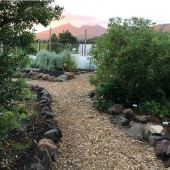
Abstract: Finding love and reciprocity in the garden during challenging times by growing community-based learning experiences.
Continue ReadingAbstract: Formal and nonformal educators help develop the environmental literacy (EL) of K-12 students, but do so in very different contexts. This paper describes educators’ views of their roles in developing student environmental literacy and barriers to that work. Educators with more advanced EL mentioned practices such as perspective taking and information evaluation. Many educators highlighted developing a connection – between students and the environment or between curriculum and students’ lives – as key to their work. The barriers identified reflect previous research, with nonformal educators also identifying access to student and peoples’ access to their sites as a major barrier.
Continue Reading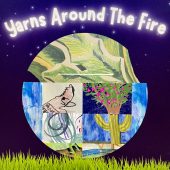
Abstract/Description: What happens when educators and professionals take a long-standing pedagogical activity, The Council of All Beings, and reshape the experience into a picture book? This paper provides a link to the story and relates the storytelling process that occurred with such an adaptation. The paper then explores the benefits of storytelling for young people and considers how co-creating stories can be an antidote to ecophobia while fostering empathy and sparking emotional engagement in the natural world. Finally, the author suggests that co-creating storytelling activities and picture book creations could be used to help children reimagine the world.
Continue Reading
Abstract: This case study follows the eight-year development of an environmental anthropology course, beginning with my own failure as a teacher to provide students an adequate way of thinking and acting amid planetary crisis. It then turns to a diagnosis of three challenges students face when thinking about global ecological futures: (1) an inability to act, (2) an inability to imagine how an individual can make a difference, and (3) an inability to conjure an adequate sense of hope. For each of these challenges, I introduced a conceptual metaphor designed to help us think anew, where a conceptual metaphor is a trope that enables thinking about one conceptual domain in terms of another. The metaphor of wayfaring helped us overcome the conviction that one must become an expert before acting. The metaphor of seed planting helped us reimagine how an individual can contribute to larger-scale change. Finally, I introduce two new conceptual metaphors for thinking about hope amid planetary crisis—weedy invasions and broken jars. By working with these tropes, I propose an alternative way of thinking about hope that does not rely on a sense of optimism. Along the way, I make two broad arguments. First, thinking through novel conceptual metaphors, what I call metaphor work, is a worthwhile technique for approaching planetary crisis with students. Second, an undergraduate seminar is an excellent place to experiment with new ways of thinking about, and living in, the Anthropocene.
Continue ReadingAbstract: Sustainability educators are in a difficult spot. They must describe our unsustainable impacts on the environment and marginalized peoples, our growing understanding of how these impacts affect future generations and other species, and our failures to make the changes necessary to approach sustainability. At the same time they must avoid pushing students over an obscure tipping point where such information causes them to retreat into despair. For despair leads to inaction, which will only hasten the deterioration of planetary health. We propose two approaches to helping students avoid despair and strengthen their motivation for pursuing sustainable changes. One approach appeals to the motivational energy of hope and the other to the power of tranquil resolve described in Stoicism. We understand these approaches to be complementary. The skills of hope work well when we are pursuing long shot goals, while those of tranquil resolve aid when the achievement of our goals is beyond our own control. While the skills of hope are more aligned with our cultural norms and thus likely easier to teach, skills associated with a tranquil resolve can more powerfully (and lastingly) address the climate challenges we face. Pedagogical examples and strategies of these skills in action are offered throughout.
Continue Reading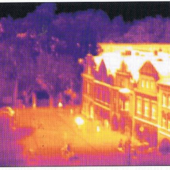
Abstract: A brief history of climatological science sets the stage for understanding the rise of the greenhouse gas thesis. That science is true as far as it goes, justifying our confidence, but it is an incomplete assessment of climatic systems. We have spent 40 years accepting the “pot lid” as the cause of the pot boiling over. That the “sun-warmed surface” impacts climate has been known for nearly 200 years. But greenhouse science failed to incorporate that and other scientific findings on urbanism, water cycles, and land management practices. To remedy this, I propose a broad climatic paradigm to address the actual cause of warming and provide a far more hopeful future with ample opportunities to resolve over-heating more completely, locally, and in a matter of months, years, or maybe decades, instead of centuries. Lastly, I discuss the significance of paradigm change, a new approach, and an expanded curriculum as challenges to sustainability education.
Continue Reading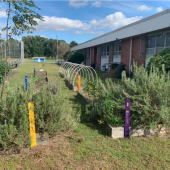
Abstract: This case study provides insights into a collaborative effort involving D.C. Virgo Preparatory Academy, a public university-run lab school in downtown Wilmington, North Carolina. The article overviews the combined efforts of DCVPA staff, university faculty, and community partners to engage the students in unique, hands-on learning experiences, particularly in the STEM areas. Students have taken the initiative to serve as change agents and leaders in the work. Several efforts at the school, including a composting program, a recycling effort, a seedling project, and a mycology lab, provide a window into dynamic experiential learning that has brought the university and school together.
Continue Reading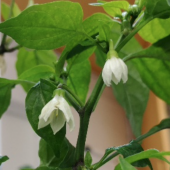
Abstract: To successfully implement the UN’s Sustainable Development Goals (SDGs), we must encourage all citizens to work together to enable a good life not only for us now but future generations too. In this article, we present an experiment carried out in autumn 2020 on a smart aeroponic garden. The goal of the experiment was to learn more about aeroponic cultivation and IoT technology and to acquire the know-how that would enable the participants to influence the environmental burden of food production. Our experiment showed that technology could also be used to introduce sustainable development themes to reach those target groups whose attention could not be attracted through other methods.
Continue ReadingAbstract: Many have written about the different ways people participate in authentic scientific research. However, some of the means used to engender public support in research may prove ultimately counterproductive. In this opinion piece we argue that science is not fun much of the time, and more importantly that fun in itself is not an end goal in engaging public audiences. To draw participation, we need to focus on motivation; which can include fun some of the time.
Continue Reading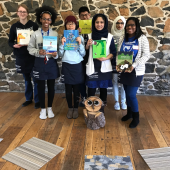
Abstract: A partnership between a university and local arboretum was expanded to include the campus library as a collaborator. Instead of having sustainability-themed programming between the two institutions focus on just the environmental components of the Sustainable Development Goals (SDGs), a library brings attention to literacy and information access across all aspects of the partnership. We share two public programs held between our university and an arboretum with strong involvement by the library in the development and execution stages, thereby increasing the connections across the SDGs and progress towards the 2030 agenda.
Continue Reading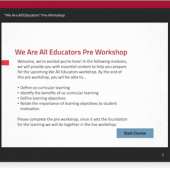
Abstract: Staff members play an important role in guiding students through living lab sustainability projects at Harvard University. Since there are significant opportunities for co-curricular learning in these settings, we created the “We Are All Educators” professional development workshop to empower those staff members to optimize and track student learning throughout these projects. In this case study, we will briefly summarize key principles of CCL and discuss its benefits as a tool for sustainability education in higher education. We will also describe our planning and implementation process for the workshop, the content of our training materials, and the results. Finally, we will end with key takeaways, as our workshop may be applicable to co-curricular learning in a variety of higher education contexts.
Continue Reading
Abstract: This word journey explores flaws in our approach to cultivating environmental ethics and caring for biodiversity, especially among youths, through the lens of Carson McCullers’ classic story about the tragic but common failure of so many to achieve love between human beings.
Continue Reading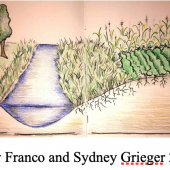
Abstract: This study examined how placemaking curricula shaped teacher candidate (candidate) knowledge, dispositions, and skills to understand, appreciate, and sustain local diversity, as evidenced through candidate reflections and products created in an elementary teacher education course integrating civic science concepts and practices into elementary classrooms. This study explored how placemaking curricula engaged community stakeholders in meaningful shared inquiry on real-world challenges, while meeting state science education standards. Placemaking inquiry projects developed by candidates focused on soil and water conservation, and sustaining diversity in schoolyard spaces. Curricula engaged candidates in learning soil and water conservation techniques from local farmers and conservation leaders, then developing and sharing co-authored civic science children’s books on conservation topics aligned to grade-level standards. As further placemaking curricula, candidates partnered with elementary teachers and students to guide schoolyard observations, designs, and models constructed to sustain diverse abilities, cultures, and ecologies. Presentations to parents and peers celebrated shared insights.
Continue Reading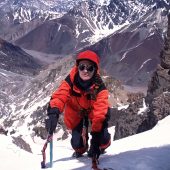
Abstract: Glacial archaeology is an emerging field of scientific research, rapidly expanding in Scandinavia, the Alps and North America. And yet its origins are to be found in the Andes of Argentina. Constanza Ceruti is the first woman high altitude archaeologist in history. Her pioneering contributions to this field of research involve having ascended and explored, sometimes solo and unsupported, more than one hundred peaks above 5000 meters in remote corners of the Andes. In 1999, Ceruti codirected the scientific excavations on mount Llullaillaco (6739 m), the highest archaeological site in the world, and co-discovered three extraordinarily preserved frozen mummies, together with an outstanding collection of artifacts from the Inca civilization (currently housed at the Museum of Mountain Archaeology in Salta, Argentina). In recent years, Ceruti has climbed hundreds of mountains in different parts of our planet, to study (from an anthropological perspective) their role in pilgrimage, folklore, popular devotion, mythology, identity and tourism. Her academic production includes more than one hundred scientific papers and twenty-five books on sacred mountains of the Americas, Europe, Asia, Australia and Polynesia. A northern hemisphere predominance in anthropology at large, and particularly in high mountain and glacial archaeology (associated also with mobbing and male chauvinsm in mountaineering), have led to a lack of proper recognition, not only for her own pioneering career, but for the rightful place of the Andes at the forefront of academic research on the sacred role of mountains in ancient cultures.
Continue Reading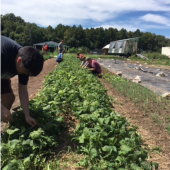
Abstract: This research explores the role that place attachment and place meaning towards an urban farm play in predicting undergraduate students’ civic-mindedness, an important factor in sustainability and social change. In 2017 and 2018, three STEM courses at a private university in the Midwest incorporated a local urban farm as a physical and conceptual context for teaching course content and sustainability concepts. Each course included a four to six-week long place-based experiential learning (PBEL) module aimed at enhancing undergraduate STEM student learning outcomes, particularly place attachment, situated sustainability meaning-making (SSMM), and civic-mindedness. End-of-course place attachment, SSMM, and civic-mindedness survey data were collected from students involved in these courses and combined with institutionally provided demographic information. Place attachment and SSMM surveys, along with the course in which the students participated, were statistically significant predictors of students’ civic-mindedness score.
Continue Reading
Abstract: Industrial forms of food production and consumption are tied to environmental and socio-economic crises like climate change and social injustice. Changes in consumer behavior provide a lever to initiate transformations toward a more sustainable food system. One vehicle that is widely recognized as having the ability to encourage behavior change at large is education. Sustainability education has become increasingly popular over the past two decades, often being studied in innovative teaching-learning formats which employ transformative pedagogies that aim to foster critical consciousness through deep listening, dialogue, action, and reflection of students. However, classical teaching formats that employ more transmissive pedagogies, focused on delivery and mastery of content, have been comparatively little researched in the field of sustainability with regard to how they impact student behavior. Thus, this research aims to study if transmissive sustainability education can encourage university students to consume food more sustainably. To accomplish this, a case study with 12 undergraduate students in a food sustainability course was conducted. Mixed-methods data collection and analysis techniques, such as questionnaires and interviews, were utilized in order to track participants’ self-reported food consumption behaviors before, during, and after the course. Results suggest agreement among participants about the importance of course contents, but show no significant changes in their food consumption behaviors. The findings of this empirical study support the conclusion that imparting sustainability knowledge alone is insufficient to trigger behavior change.
Continue Reading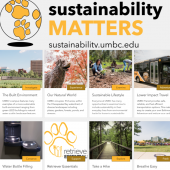
Abstract: Does the use of an interactive GIS web map significantly influence the level of sustainability stakeholder engagement at institutions of higher education? With over 1,000 institutions of higher education across the globe, the AASHE STARS report is one of the main tools available to sustainability professionals. For many institutions, the STARS report serves as a metric of sustainability progress and a source of new ideas and methods, while GIS provides a platform to display information within a context of systems, places, or times. Interactive web GIS allows for digital storytelling and can allow the user to explore specific information pertinent to their interests. This research explores potential links between the use of web GIS platforms and levels of campus engagement as measured by STARS.
Continue ReadingAbstract: I was slow in coming to see the desperate need of sustainability education, in part because of a missed opportunity in my field of outdoor adventure education (OAE). Although a burgeoning set of scholars agree that OAE is strategically placed to educate for sustainability, little change within our discipline has occurred. To encourage the transition, this paper has four central aims. First, I contextualize the implications at stake by summarizing recent scientific predictions around climate change. Second, I differentiate sustainable OAE into the sustainability of OAE (e.g., its practices, footprint size, etc.) and OAE for sustainability (e.g., curricula that promotes education about sustainability), noting that despite long-standing petitions to address both, progress has been made in neither. Third, I celebrate, with others, the inherent potential that OAE has to promote sustainability through its educating in natural environs, within living/learning communities, which utilize physical/sensory, affective and intellectual ways of knowing that inspire critical impulses. Fourth, I outline the central changes that need to occur in order to create sustainable OAE. The foremost change needed is for OAE programs to curricularly commit to promoting a sustainability worldview, including values, knowledge, dispositions, and agency related to environmental, social, and economic justice. However, change of this depth will require a revision of OAE course offerings that allow for multiple and prolonged participant engagement over time. Such engagement, then, necessitates that OAE shift its emphasis from remote and sublime landscapes, to programs that not only connect participants to the places in which they reside, but cultivate a care and affection for them. This appreciation can be created through a combination of adventurous learning and microadventures. In sum, “local landscapes, far more often, as a way of life” encapsulate the changes OAE might make in contribution to the global need of sustainability.
Continue Reading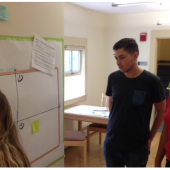
Abstract: Sustainability education can productively focus on concepts and/or skills, each playing an important role in preparing students to promote sustainability in society. We describe here the skills-based curriculum in an environmental sustainability practicum designed for undergraduate students. Although our curriculum provides training in numerous relevant skills, we focus here on one in particular: scenario planning. Originally developed in the 1970s by Shell Oil to develop robust business strategies in the face of future uncertainties, scenario planning is applicable to any planning domain where future conditions may be driven by the outcome of critical unknowns. For example, planning for effective community resilience in the face of climate change may depend on the degree of government support for renewable energy systems. In this practicum, students work in teams of 3-4 on the same challenge: Assess a specified human-natural system for its vulnerability to climate change in the next 20 years and develop solutions that effectively increase the resilience of the system in the face of uncertainty.
Scenario planning involves six steps: (1) Identify driving forces for future changes; (2 and 3) Identify certainties and uncertainties for future conditions; (4) Rank uncertainties by the degree to which they might affect future conditions; (5) Create a 2×2 grid of possible future scenarios based on the two most influential uncertainties; and (6) Describe the future world in each of these four scenarios. Using creative ideation techniques developed by IDEO for their Human-Centered Design methodology, students then use these four scenarios as the basis for envisioning effective strategies for promoting resilience regardless of how the critical uncertainties unfold (adaptive planning) or for influencing uncertainties to increase the probability that preferred scenarios manifest.
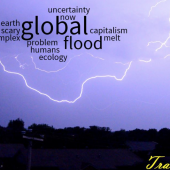
Abstract: The experience and impacts of climate change are uneven across generations, income classes, cultural groups, and geographical locations. Efforts to document and understand such experiences and related perspectives are increasing. Particularly among student groups, there is much attention on understanding how children and teenagers perceive climate change. However, until now, such perspectives of graduate students have not been represented in the literature. We, thus, surveyed and spoke with graduate students from a Geography, Planning and Environment Program at Concordia University in Montreal / Tiohtià:ke, Quebec, Canada. As a sample of next-generation decision makers, they shared fears, concerns, and recommendations consisting of both bio-physical and socio-political scientific dimensions. They expressed interdisciplinary perspectives related to climate change vulnerability, mitigation, and adaptation as they relate to water and extreme weather. Their fears included uncertainties pertaining to climate and human behaviors, and the possibility of surpassing global carrying capacities that could result in irreversible and lethal disasters. Considerations involved recognizing the vulnerability of the climate system and of humans, with a focus on socio-political injustices. Students placed a strong focus on emerging opportunities, such as fostering community development and investing in innovative technologies. They recommended power shifts, through paradigm awareness and reformed policies, where currently vulnerable populations access more decision-making power. They suggested fostering interdisciplinary and international cooperation to integrate climate science, involving age-appropriate modelling programs, into school curricula, and learning about human positionality and from resilient populations. We consider wicked problems, psychological distancing, and climate literacy as influential concerns in shaping climate change contexts and literacy. Our methodology allowed research participants to guide the study’s questions and foci with the use of a survey, collectively-generated word collages, and a focus group. The activities prompted space for the group to practice roleplaying as decision makers. As gentle form of Participatory Action Research, the methods could guide other groups to reflect upon and document their perspectives.
Continue ReadingAbstract: While it is widely recognized that effectively addressing climate change requires a drastic reduction in carbon emissions, we nonetheless find ourselves in an impasse, unable to imagine nor bring about a post-carbon future. This is, in part, because climate change is not only a technological problem, but also a philosophical, cultural, and aesthetic problem—an existential crisis of thinking, or perhaps unthinking. To unthink the carbon regime, higher education must forge new thought models and educational platforms that operate in solidarity across disciplinary scales and territories. This report documents a collaborative course development process for a grant-funded transdisciplinary course entitled: Unthinking Oil: Public Architecture and the Post-Carbon Imaginary. In particular, we discuss a virtual Unthinking Oil Workshop held with students and faculty from a range of disciplines. The workshop provoked broad discussions regarding the role of higher education in addressing the many entanglements between climate change, society, and the built environment.
Continue Reading
Abstract: After 20 plus years as a sustainability educator, the author had one of those lie-awake-at-night-staring-at-the-ceiling experiences where she faced some hard questions about the state of the world. In this article, describes her subsequent journey investigating the role of listening in shifting to a life-sustaining society and her Ph.D. research into how to support listening across differences to address complex social-ecological challenges.
Continue Reading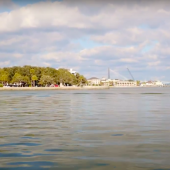
What if a river or a creek were to tell us its story? In this short film and interview, we offer a glimpse into the ecological philosophy guiding our efforts to create “more sustainable ways of living with water and how to appreciate its capacities to support all life.”
Continue ReadingAbstract: In 2008 astronauts aboard the International Space Station captured an image of sunlight as it passed through the Earth’s thin atmosphere, described as the thin blue line of “all that stands between life on Earth and the cold, dark void of space.” At the center of sustainability education is a discourse of climate change and life’s demise on the planet. In this short article, the contributing role of the United Nations University’s Regional Centres of Expertise (RCEs) for sustainability education is explored with respect to community-based climate change adaptation, notably through RCE Dhaka (Bangladesh) as an example of the challenges and opportunities for climate change adaptation in one of the most heavily populated megacities of the Global South.
Continue ReadingAbstract. This study investigates whether children at an urban place-based environmental education camp can develop three dimensions of eco-character development after week-long participation: Head (knowledge), Hand/Feet (action), and Heart (care/connection). Using a community-based and inquiry-driven curriculum, campers practiced the roles of an arborist, ecologist, and environmental steward. Fifty-five Campers were assessed on all three dimensions using a 10-question pre/post-survey. An overall increase in content knowledge, relationships with nature, and motivation for pro-environmental behaviors were found. Outdoor environmental education summer camps and other out of school experiences may be the new avenue for educators and instructors to consider when trying to promote positive eco-character development in future generations.
Continue Reading
Abstract: Ecoliteracy can be defined as an understanding of natural systems and connections between biotic and abiotic factors within sustainable future. Green consumerism is an observable side of ecoliteracy. The aim of this study is, therefore, to examine the long-term effect of environmental education programmes intended for in-service teachers in terms of behavioural change. The teachers were joined ecopedagogy-based education programmes funded by TUBITAK (The Scientific and Technological Research Council of Turkey) in Turkey and were followed up after seven years. The methodology of the study was mixed method within a case study. Quantitative data were collected by a survey and analysed by R statistics. Qualitative data were analysed by content analysis. It was found that the green consumer behaviours of in-service teachers have improved in the long term. However, it is needed more follow up studies within different time frames and country comparison studies in the future.
Continue Reading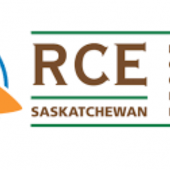
Abstract: Three decades ago Julius Nyerere (1990) wrote Challenge to the South. In response to the legacy of colonialism, Nyerere challenged the nations of the Global South to advance their development and to free their people. These concerns are as relevant today as they were in the 1990s. Established for the United Nations Decade of Education Sustainable Development in 2005, there are now over 175 Regional Centres of Expertise (RCEs) on Education for sustainable Development (ESD). This paper offers a case study of RCEs worldwide with a particular focus on challenges, and responses, including a focus on the select Sustainable Development Goals (SDGs) of poverty and health. Further, an account is given of RCEs which have attended to the recognition of Indigenous and traditional ways of knowing.
Continue Reading